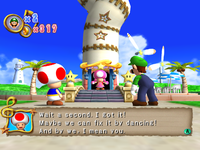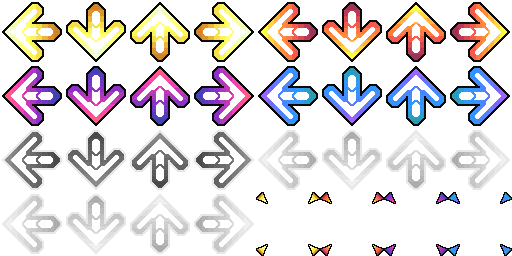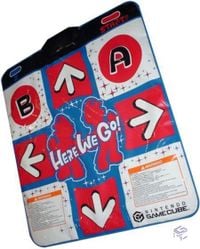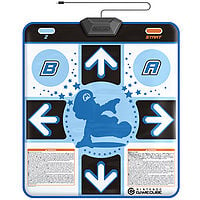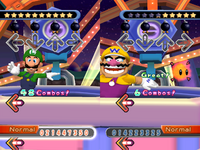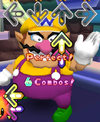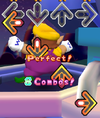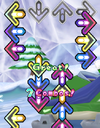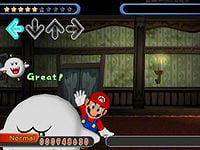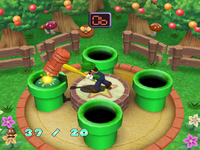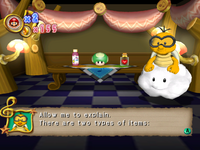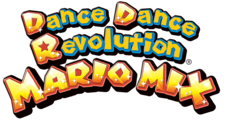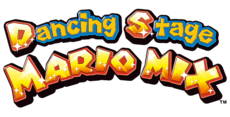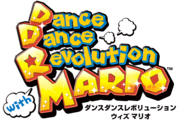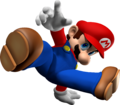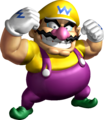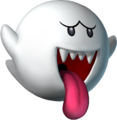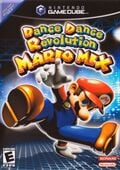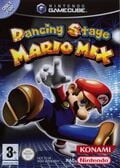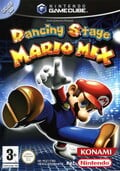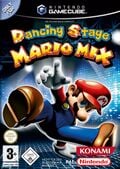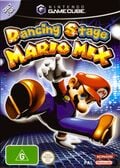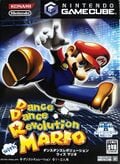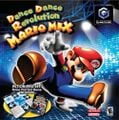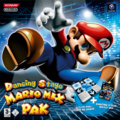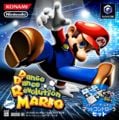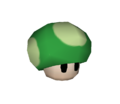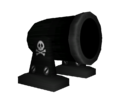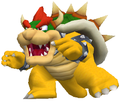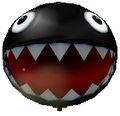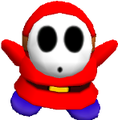Dance Dance Revolution: Mario Mix: Difference between revisions
(→Music) |
(Already mentioned) Tag: Mobile edit |
||
| (81 intermediate revisions by 20 users not shown) | |||
| Line 5: | Line 5: | ||
|publisher=[[Nintendo]] | |publisher=[[Nintendo]] | ||
|platforms=[[Nintendo GameCube]] | |platforms=[[Nintendo GameCube]] | ||
|release={{ | |release={{flag list|Japan|July 14, 2005|USA|October 24, 2005|Europe|October 28, 2005|Australia|November 24, 2005<ref>{{cite|language=en|url=themushroomkingdom.net/games/ddrmm|title=''Dance Dance Revolution: Mario Mix''|publisher=The Mushroom Kingdom|accessdate=June 28, 2024}}</ref>}} | ||
|languages={{languages|en_us=y|en_gb=y|es_es=y|fr_fr=y|de=y|it=y|jp=y}} | |||
|genre=[[Genre#Rhythm games|Rhythm]] | |genre=[[Genre#Rhythm games|Rhythm]] | ||
|modes=Single player, versus | |modes=Single player, versus | ||
|ratings={{ratings|esrb=E|cero=A|pegi=3}} | |ratings={{ratings|esrb=E|cero=A|pegi=3|acb=g|usk=0}} | ||
| | |format={{format|gcn=1}} | ||
|input={{input|gcn=1}}[[Nintendo GameCube#GameCube Action Pad|Nintendo GameCube Action Pad]] | |input={{input|gcn=1}}[[Nintendo GameCube#GameCube Action Pad|Nintendo GameCube Action Pad]] | ||
|serials={{flag list|Japan|DOL-GWZJ-JPN|USA|DOL-GWZE-USA|Europe|DOL-GWZP-EUR}} | |||
}} | }} | ||
'''''Dance Dance Revolution: Mario Mix''''' (known as '''''Dancing Stage: Mario Mix''''' in Europe and Australia) is a [[Nintendo GameCube]] game in the [[Super Mario (franchise)|''Super Mario'' franchise]] based on [[Konami]]'s ''{{wp|Dance Dance Revolution}}'' series, and it is the second dancing game to be released on the Nintendo GameCube, after ''{{wp|MC Groovz Dance Craze}}''. The songs included are {{wp|electronic dance music}} covers primarily from various aspects of the ''Super Mario'' franchise, including songs from not only the mainline titles but also the [[Mario Party (series)|''Mario Party'' series]], [[Paper Mario (series)|''Paper Mario'' series]], ''[[Mario Kart (series)|Mario Kart]]'' series, and more. In addition, a number of songs in the game are rearranged from classical, royalty-free songs such as {{wp|Wolfgang Amadeus Mozart}}'s "{{wp|Piano Sonata No. 11 (Mozart)|Turkish March}}." A unique feature of the game from other ''Dance Dance Revolution'' titles is the addition of the Mush Mode, where various ''Super Mario''-themed items replace arrows with their own gimmicks to increase the difficulty of the song. | |||
'''''Dance Dance Revolution: Mario Mix''''' (known as '''''Dancing Stage: Mario Mix''''' in | |||
'' | The game uses an included ''Super Mario''-themed dance mat, referred to as an Action Pad. However, players have the option to play with a controller if they lack a dance mat. The game uses the same engine from the GameCube installments of the ''Mario Party'' series, including reusing character models, animations, and sound effects. | ||
{{br|left}} | {{br|left}} | ||
==Story Mode== | ==Story Mode== | ||
The opening scene starts out with [[Waluigi]] breaking into [[Truffle Towers]]. This is troublesome as the [[Music Key]]s are able to grant any wish. However, when Waluigi opens the door to the room of the four Music Keys, they all scatter across the [[Mushroom Kingdom]] except for one that Waluigi gets to keep. Meanwhile, [[Toad]], having seen this, rushes to tell Mario or Luigi, depending on which character the player chose. | '''From the instruction booklet:''' | ||
<blockquote>Someone has stolen the Music Keys, which contain the power of music! They were locked up in Truffle Towers for safekeeping, but someone broke the seal and unleashed this power onto the Mushroom Kingdom. Now the chaotic power of music has begun to wreak havoc on the land, causing floods, whirlpools, and other disasters. | |||
Once again, it's up to Mario to save the day! Only this time, he's got to do it in his dancing shoes! Legend has it that dancing can make magic happen. And Mario's going to need all the magic he can get to recapture the scattered Music Keys and restore order to the world. | |||
</blockquote> | |||
The opening scene starts out with [[Waluigi]] breaking into [[Truffle Towers]]. This is troublesome as the [[Music Key]]s are able to grant any wish. However, when Waluigi opens the door to the room of the four Music Keys, they all scatter across the [[Mushroom Kingdom]] except for one that Waluigi gets to keep. Meanwhile, [[Toad]], having seen this, rushes to tell [[Mario]] or [[Luigi]], depending on which character the player chose. | |||
Toad warns Mario (or Luigi) that someone has stolen the Music Keys and explains the trouble that this causes. Mario decides to stop Waluigi, and Toad decides to come with him to Truffle Towers. On a boat, the two cross a river, and after climbing a vine, they reach Truffle Towers. However, once there, the two find the doors to Truffle Towers locked. Waluigi then laughs and tosses a [[Bob-omb]] at them, knocking Mario down a nearby [[Warp Pipe]] into a cavern filled with [[Goomba]]s, though Mario is able to get out by dancing, causing the mushroom he is standing on to grow. After Mario escapes the cavern, he and Toad enter a shop run by a [[Lakitu]], who has the key to Truffle Towers. He agrees to give it to them only if Mario is able to get rid of the [[Koopa Troopa]]s playing in his farm. After Mario does so, Lakitu gives him and Toad the key, and the latter two enter Truffle Towers. Inside is Waluigi with one of the Music Keys; he refuses to return it unless he is beaten in a dance-off. After Mario and Toad beat him, Waluigi is gone and the Music Key is recovered. Mario and Toad set off on the [[SS Brass]] to recover the other keys. | Toad warns Mario (or Luigi) that someone has stolen the Music Keys and explains the trouble that this causes. Mario decides to stop Waluigi, and Toad decides to come with him to Truffle Towers. On a boat, the two cross a river, and after climbing a vine, they reach Truffle Towers. However, once there, the two find the doors to Truffle Towers locked. Waluigi then laughs and tosses a [[Bob-omb]] at them, knocking Mario down a nearby [[Warp Pipe]] into a cavern filled with [[Goomba]]s, though Mario is able to get out by dancing, causing the mushroom he is standing on to grow. After Mario escapes the cavern, he and Toad enter a shop run by a [[Lakitu]], who has the key to Truffle Towers. He agrees to give it to them only if Mario is able to get rid of the [[Koopa Troopa]]s playing in his farm. After Mario does so, Lakitu gives him and Toad the key, and the latter two enter Truffle Towers. Inside is Waluigi with one of the Music Keys; he refuses to return it unless he is beaten in a dance-off. After Mario and Toad beat him, Waluigi is gone and the Music Key is recovered. Mario and Toad set off on the [[SS Brass]] to recover the other keys. | ||
| Line 49: | Line 54: | ||
==Characters== | ==Characters== | ||
===Playable=== | ===Playable=== | ||
{|class="wikitable"style="width:100%;text-align:center" | |||
|-style="color:white;background:#FF2400" | |||
!width=10%|Image | |||
!width=20%|Name | |||
!width=70%|Description | |||
|- | |||
|style="background:white"|[[File:DDR Mario Alternate Artwork.png|50px]] | |||
|[[Mario]]<br><br>''Our hero is going to need some fancy footwork to get through this adventure!'' | |||
|align=left|Mario is the main protagonist and the default playable character. He is Player 1 in Versus Play. | |||
|- | |||
|style="background:white"|[[File:DDR Luigi Artwork.png|54px]] | |||
|[[Luigi]]<br><br>''Mario's little brother has his own special dance moves!'' | |||
|align=left|Luigi is the other playable character in this game and is Player 2 in Versus Play. He plays identically to Mario. | |||
|} | |||
===Non-playable=== | ===Non-playable=== | ||
{|class="wikitable"style="width:100%;text-align:center" | |||
|-style="color:white;background:#FF2400" | |||
!width=10%|Image | |||
!width=20%|Name | |||
!width=70%|Description | |||
|- | |||
|style="background:white"|[[File:ToadMugshotDDR.png]] | |||
|[[Toad]]<br><br>''Mario and Luigi's loyal companion.'' | |||
|align=left|Toad appears in the game's various menus and is featured as Mario and Luigi's companion in Story Mode, providing narration and commentary for the game's events. He cannot dance and relies on the Mario Bros.' skills to proceed through the game. | |||
|- | |||
|style="background:white"|[[File:LakituMugshotDDR.png]] | |||
|[[Lakitu]] | |||
|align=left|Lakitu is the game's main shopkeeper who sells helpful items throughout the adventure. He has the key to Truffle Towers in [[World 1 (Dance Dance Revolution: Mario Mix)|World 1]] and will give it to the Mario Bros. provided they clear his garden of [[Koopa Troopa]]s in "[[Garden Boogie]]." | |||
|- | |||
|style="background:white"|[[File:WaluigiMugshotDDR.png]] | |||
|[[Waluigi]]<br><br>''The Music Key he captured can help him become the best dancer in the kingdom!'' | |||
|align=left|Waluigi is the releaser of the Music Keys in Truffle Towers and serves as the game's first boss in World 1. He is featured in his signature song, "[[Destruction Dance]]." | |||
|- | |||
|style="background:white"|[[File:ToadetteMugshotDDR.png]] | |||
|[[Toadette]] | |||
|align=left|Toadette is the owner of a hotel in [[World 2 (Dance Dance Revolution: Mario Mix)|World 2]] that was accidentally turned into a corkscrew by the game's protagonists. She demands them to fix it by having them dance to "[[Jump! Jump! Jump! (song)|Jump! Jump! Jump!]]" She points the protagonists to the sea when talking about "shiny globes," though they run off before she finishes talking. | |||
|- | |||
|style="background:white"|[[File:LakituPirateMugshotDDR.png]] | |||
|[[Lakitu]] (pirate) | |||
|align=left|This Lakitu is the owner of the shop called Pirate's Plunder in World 2 and is dressed and speaks like a pirate. He has the [[Boogie Booster]] that can go through whirlpools, but he refuses to give it up to the game's protagonists unless they defeat him in "[[Fishing Frenzy]]" (or "[[Pirate Dance]]" if the game is played on Story Mode EX). | |||
|- | |||
|style="background:white"|[[File:HammerBrosMugshotDDR.png]] | |||
|[[Hammer Bro]]s. | |||
|align=left|A pair of Hammer Bros. obstructs the protagonists in [[World 3 (Dance Dance Revolution: Mario Mix)|World 3]], being the first boss dance of the world. Their signature song is "[[Hammer Dance]]." They are later seen with Wario when the protagonists leave the world. | |||
|- | |||
|style="background:white"|[[File:WarioMugshotDDR.png]] | |||
|[[Wario]] | |||
|align=left|Wario resides in his carnival in [[World 3 (Dance Dance Revolution: Mario Mix)|World 3]], where he is first seen on a roller coaster while holding a Music Key. This causes the protagonists to chase him until he challenges them to a dance-off to "[[Starring Wario!]]" When he loses, he begrudgingly hands over the Music Key and yells that he will get the key back when the protagonists leave. | |||
|- | |||
|style="background:white"|[[File:FreezieMugshotDDR.png]] | |||
|[[Freezie]] | |||
|align=left|A giant Freezie sitting on top of a snowy mountain is the boss of [[World 4 (Dance Dance Revolution: Mario Mix)|World 4]], which has the final Music Key embedded in it. At first, it is silent when Toad politely requests for the key, but it turns and reacts when Toad suggests the Mario Bros. dance to melt it. Its signature song is "[[Deep Freeze (song)|Deep Freeze]]." | |||
|- | |||
|style="background:white"|[[File:BowserMugshotDDR.png]] | |||
|[[Bowser]]<br><br>''But...what are Bowser's reasons for wanting the Music Keys?'' | |||
|align=left|Bowser steals the Music Keys from Toad shortly after they arrive in Truffle Towers, taking them to [[World 5 (Dance Dance Revolution: Mario Mix)|World 5]]. Before Bowser can use the Music Keys to lend him power, Toad and the Mario Bros. steal the keys, after which Bowser demands a dance-off to "[[Bowser's Castle (Dance Dance Revolution: Mario Mix)|Bowser's Castle]]" before they can leave. Once defeated with the [[Rocket Part]]s, Bowser explains he wanted the Music Keys to fix his tone-deafness. | |||
|} | |||
===Background characters=== | |||
<gallery> | |||
DDRMM Pipe Pop.png|[[Goomba]] | |||
DDRMM PiranhaPlant.png|[[Piranha Plant]] | |||
DDRToadette.png|[[Shy Guy]] | |||
DDRMM KoopaTroopa.png|[[Koopa Troopa]] | |||
DDRMM Bob-omb.png|[[Bob-omb]] | |||
Tweester DRRMarioMix.png|[[Tweester|Cyclone]] | |||
Banana Storm.png|[[Ukiki]] | |||
DRRMarioMixstory7.png|[[Cheep Cheep]] | |||
Blooper DRRMarioMixs.png|[[Big Blooper]] | |||
BooDDRMarioMix.png|[[Boo]] | |||
ChainChompChase.png|[[Chain Chomp]] | |||
DDRmrbliz.png|[[Mr. Blizzard]] | |||
DDRMM Penguin.png|[[Penguin]] | |||
DDRMM BanzaiBill.png|[[Bomber Bill|Banzai Bill]] | |||
</gallery> | |||
==Gameplay== | ==Gameplay== | ||
===Action | ===Action Pad=== | ||
[[File:DDRMM Arrow.webp|thumb|left|The arrows, step zone, and Mush Mode UI]] | |||
[[File:Oldmat.jpg|thumb|Dance Mat v1]] | [[File:Oldmat.jpg|thumb|Dance Mat v1]] | ||
[[File:Dancemat.jpg|thumb|Dance Mat v2]] | [[File:Dancemat.jpg|thumb|Dance Mat v2]] | ||
Included with the game is a dance mat | Included with the game is a dance mat, referred to as an Action Pad, that plugs into a controller socket on the [[Nintendo GameCube|GameCube]]. Then, standing in the center of the Action Pad, the player can simply step on an arrow when it reaches the bar on the top of the screen, called the step zone: left, right, up, or down. The player can choose to play with either [[Mario]] or [[Luigi]] in a number of modes and difficulty levels with nearly 30 songs. As the difficulty rises, moves such as jumps to step on two arrows at the same time are required, when the player must move around the mat quickly. | ||
Incidentally, the game can be sold by itself without | Incidentally, the game can be sold by itself without the Action Pad. The regular controller then uses {{button|gcn|stick}} or {{button|gcn|pad}} and the face buttons for directional input, with {{button|gcn|Y}} for up, {{button|gcn|A}} for down, {{button|gcn|B}} for left, and {{button|gcn|X}} for right. | ||
===Dance meter=== | ===Dance meter=== | ||
| Line 75: | Line 145: | ||
===Grades for each step=== | ===Grades for each step=== | ||
Each step the player makes gets a grade that affects the player's overall score, by giving points per step: | Each step the player makes gets a grade that affects the player's overall score, by giving points per step: | ||
*'''{{color|Perfect! | *'''{{color|#FF6633|Perfect!}}:''' The player hit the step right on the mark. In actuality, there is a margin of error for this step. If they hit the step exactly, the arrow flashes white; if they miss it slightly, it flashes yellow. Either way, the player earns the maximum points for the step. | ||
*'''{{color|Great! | *'''{{color|#00CA00|Great!}}:''' Also known as Super. The player hit the step almost perfectly. The player earns half the maximum points for the step. | ||
*'''{{color|Early/Late | *'''{{color|#0000DD|Early/Late}}:''' The player missed by a bit. The player earns no points, and the dance meter stays the same. | ||
*'''{{color|Miss... | *'''{{color|#9966CC|Miss...}}:''' The player did not step on the arrow at all. The player earns no points, and the dance meter decreases. | ||
Getting "Perfect!"s and "Great!"s not only increases the player's dance meter but also adds a combo onscreen. When the player gets a combo of 100, the announcer comments and arrows flash differently when players step on them. A combo stops if the player does a misstep (Early, Late, or Miss). As with all ''Dance Dance Revolution'' games, the announcer comments on the player's dancing skill and grade along the way. This can be turned off in the Options menu. If the player's dance meter empties, an option can allow the player to finish the song right away, but the player still gets an '''F''' grade. | Getting "Perfect!"s and "Great!"s not only increases the player's dance meter but also adds a combo onscreen. When the player gets a combo of 100, the announcer comments and arrows flash differently when players step on them. A combo stops if the player does a misstep (Early, Late, or Miss). As with all ''Dance Dance Revolution'' games, the announcer comments on the player's dancing skill and grade along the way. This can be turned off in the Options menu. If the player's dance meter empties, an option can allow the player to finish the song right away, but the player still gets an '''F''' grade. | ||
| Line 84: | Line 154: | ||
===Grades for the song=== | ===Grades for the song=== | ||
When the player keeps their dance meter filled and gets a "Cleared" message at the end of the song, these are the possible grades: | When the player keeps their dance meter filled and gets a "Cleared" message at the end of the song, these are the possible grades: | ||
*'''{{color|A|orange}}''' – ''"Can I call you a dancing master?"'' This is the top grade, earned with a couple, if any, missteps. | *'''{{color|orange|A}}''' ('''{{color|orange|AA}}''' in the Japanese version) – ''"Can I call you a dancing master?"'' This is the top grade, earned with a couple, if any, missteps. | ||
*'''{{color|B|#12AD12}}''' – ''"You're a fantastic dancer! You should dance one more time!"'' This is a very good grade, earned with very few missteps. | *'''{{color|#12AD12|B}}''' ('''{{color|#12AD12|A}}''' in the Japanese version) – ''"You're a fantastic dancer! You should dance one more time!"'' This is a very good grade, earned with very few missteps. | ||
*'''{{color|C|#0000BB}}''' – ''"Bravo!"'' This is a fair grade, earned with some missteps. | *'''{{color|#0000BB|C}}''' ('''{{color|#0000BB|B}}''' in the Japanese version) – ''"Bravo!"'' This is a fair grade, earned with some missteps. | ||
*'''{{color|D | *'''{{color|magenta|D}}''' ('''{{color|magenta|C}}''' in the Japanese version) – ''"Excellent!"'' This grade is earned with a significant number of missteps. | ||
*'''{{color|F|#FF8C00}}''' – ''"Wha-wha-what?"'' (international | *'''{{color|#FF8C00|F}}''' ('''{{color|#FF8C00|D}}''' in the Japanese version) – ''"Wha-wha-what?"'' (international) / ''"Aw, you couldn't make it!"'' (JP). A ton of missteps lead to this grade, even if the player clears the song. | ||
Two major factors decide the grade for a song: the number of missteps in relation to the song length, and total points. As the difficulty rises, more missteps can still mean a better grade ('''B'''), but the '''A''' still requires barely any missteps. | Two major factors decide the grade for a song: the number of missteps in relation to the song length, and total points. As the difficulty rises, more missteps can still mean a better grade ('''B'''), but the '''A''' still requires barely any missteps. | ||
===Difficulties=== | ===Difficulties=== | ||
[[File:DDR Super Hard Difficulty Luigi. | [[File:DDR Super Hard Difficulty Luigi.png|200px|thumb|left|An example of Super Hard difficulty in "[[Underground Mozart]]"]] | ||
*'''{{color | *'''{{color|#0000FF|Easy}}:''' Includes only left and right arrows. | ||
*'''{{color | *'''{{color|#FF6600|Normal}}:''' Basic cardinal steps. | ||
*'''{{color | *'''{{color|#FF3399|Hard}}:''' Steps per song are up to 200 at times. Common patterns appear in step sequences. | ||
*'''{{color|Very Hard | *'''{{color|#00AA00|Very Hard}}:''' The number of steps is from 125 to over 200 in some spots. Complicated patterns that require shuffling of feet and moving off the center occur. | ||
*'''{{color|Super Hard | *'''{{color|#330099|Super Hard}}:''' Over 200 steps in each song. The song "[[Bowser's Castle (Dance Dance Revolution: Mario Mix)|Bowser's Castle]]," for example, has 337 steps. Offbeat steps may also take place. | ||
In Story Mode, the player can choose | While ''Dance Dance Revolution: Mario Mix'' does not have an official difficulty chart for its songs, the game is not as intense as standard versions of ''Dance Dance Revolution''. Comparing using the difficulty measurement system introduced in [https://remywiki.com/CS_DDRMAX2_NA ''DDRMAX2 -Dance Dance Revolution 7thMIX-''], the Easy difficulty uses only left and right arrows, which standard ''Dance Dance Revolution'' games do not have; Normal difficulty is equivalent to Beginner; Hard difficulty is equivalent to Light; Very Hard difficulty has a mix of Light and Standard depending on how far in the story the song is; and songs on Super Hard difficulty contain a mix of Standard and Heavy songs also depending on far in the story the song is. | ||
In Story Mode, the player can choose Easy or Normal at the beginning of the adventure, and this choice stays permanent throughout all the songs. It can be changed only by a [[Music Wand]]. When Story Mode EX is unlocked, the option to play on Hard becomes available, and when that mode is cleared, Very Hard is unlocked. | |||
{{br}} | {{br}} | ||
| Line 107: | Line 179: | ||
===Music=== | ===Music=== | ||
{| class="wikitable sortable" | <center> | ||
!Title | {|class="wikitable sortable" style="width:60%;text-align:center" | ||
!Stage | |-style="color:white;background:#FF2400" | ||
!Game | !width=5%|Title | ||
!Original | !width=5%|Stage | ||
! | !width=50%|Game and music | ||
! | !width=15%|Original composer | ||
!width=5%|Easy | |||
!width=5%|Normal | |||
!width=5%|Hard | |||
!width=5%|Very Hard | |||
!width=5%|Super Hard | |||
|- | |- | ||
![[Here We Go!]]<br>[[File:DDRIcon1.png|150px]] | ![[Here We Go!]]<br>[[File:DDRIcon1.png|150px]] | ||
|1-1||''[[Super Mario Bros.]]'' | |1-1||''[[Super Mario Bros.]]'' ([[Ground Theme (Super Mario Bros.)|Ground Theme]])||[[Koji Kondo]]||style="background:#bef4ff"|37||style="background:#ffffaa"|47||style="background:#ffcdcd"|110||style="background:#85f1bb"|145||style="background:#e6c1ff"|193 | ||
|- | |- | ||
![[Underground Mozart]]*<br>[[File:DDRIcon2.png|150px]] | ![[Underground Mozart]]*<br>[[File:DDRIcon2.png|150px]] | ||
|1-2||''[[Mario Bros. (game)|Mario Bros.]]'' | |1-2||''[[Mario Bros. (game)|Mario Bros.]]'' (''{{wp|Eine kleine Nachtmusik|Eine Kleine Nachtmusik}}'')||{{wp|Wolfgang Amadeus Mozart}}||style="background:#bef4ff"|43||style="background:#ffffaa"|53||style="background:#ffcdcd"|173||style="background:#85f1bb"|222||style="background:#e6c1ff"|293 | ||
|- | |- | ||
![[Pipe Pop]]<br>[[File:DDRIcon3.png|150px]] | ![[Pipe Pop]]<br>[[File:DDRIcon3.png|150px]] | ||
|1-2EX | |1-2EX||{{wp|Piano Sonata No. 11 (Mozart)|Turkish March}}||Wolfgang Amadeus Mozart||style="background:#bef4ff"|49||style="background:#ffffaa"|59||style="background:#ffcdcd"|145||style="background:#85f1bb"|186||style="background:#e6c1ff"|260 | ||
|- | |- | ||
![[Garden Boogie]]<br>[[File:DDRIcon4.png|150px]] | ![[Garden Boogie]]<br>[[File:DDRIcon4.png|150px]] | ||
|1-3 | |1-3||''{{wp|Carmen}}''||{{wp|Georges Bizet}}||style="background:#bef4ff"|42||style="background:#ffffaa"|54||style="background:#ffcdcd"|154||style="background:#85f1bb"|201||style="background:#e6c1ff"|280 | ||
|- | |- | ||
![[Destruction Dance]]<br>[[File:DDRIcon5.png|150px]] | ![[Destruction Dance]]<br>[[File:DDRIcon5.png|150px]] | ||
|1-4||''[[Wrecking Crew]]'' | |1-4||''[[Wrecking Crew]]'' (Bonus Stage)||{{wp|Hirokazu Tanaka}}||style="background:#bef4ff"|45||style="background:#ffffaa"|19||style="background:#ffcdcd"|148||style="background:#85f1bb"|188||style="background:#e6c1ff"|237 | ||
|- | |- | ||
![[Jump! Jump! Jump! (song)|Jump! Jump! Jump!]]<br>[[File:DDRIcon6.png|150px]] | ![[Jump! Jump! Jump! (song)|Jump! Jump! Jump!]]<br>[[File:DDRIcon6.png|150px]] | ||
|2-1||''[[Super Mario Bros. 3]]'' | |2-1||''[[Super Mario Bros. 3]]'' ([[Athletic Theme (Super Mario Bros. 3)|Athletic Theme]])||Koji Kondo||style="background:#bef4ff"|56||style="background:#ffffaa"|80||style="background:#ffcdcd"|112||style="background:#85f1bb"|187||style="background:#e6c1ff"|256 | ||
|- | |- | ||
![[Fishing Frenzy]]*<br>[[File:DDRIcon7.png|150px]] | ![[Fishing Frenzy]]*<br>[[File:DDRIcon7.png|150px]] | ||
|2-2||''[[Yoshi's Cookie]]'' | |2-2||''[[Yoshi's Cookie]]'' ({{wp|Csikós Post|Csikos Post}})||{{wp|Hermann Necke}}||style="background:#bef4ff"|61||style="background:#ffffaa"|97||style="background:#ffcdcd"|126||style="background:#85f1bb"|160||style="background:#e6c1ff"|235 | ||
|- | |- | ||
![[Pirate Dance]]<br>[[File:DDRIcon8.png|150px]] | ![[Pirate Dance]]<br>[[File:DDRIcon8.png|150px]] | ||
|2-2EX||''[[Super Mario World]]'' | |2-2EX||''[[Super Mario World]]'' ([[Ground Theme (Super Mario World)|Ground Theme]])||Koji Kondo||style="background:#bef4ff"|51||style="background:#ffffaa"|104||style="background:#ffcdcd"|142||style="background:#85f1bb"|199||style="background:#e6c1ff"|258 | ||
|- | |- | ||
![[In the Whirlpool]]*<br>[[File:DDRIcon9.png|150px]] | ![[In the Whirlpool]]*<br>[[File:DDRIcon9.png|150px]] | ||
|2-3 | |2-3||''{{wp|Pomp and Circumstance Marches|Pomp and Circumstance}}''||{{wp|Edward Elgar}}||style="background:#bef4ff"|76||style="background:#ffffaa"|100||style="background:#ffcdcd"|125||style="background:#85f1bb"|160||style="background:#e6c1ff"|224 | ||
|- | |- | ||
![[Step by Step]]<br>[[File:DDRIcon10.png|150px]] | ![[Step by Step]]<br>[[File:DDRIcon10.png|150px]] | ||
|2-3EX||''Super Mario World'' | |2-3EX||''Super Mario World'' ([[Bonus Men BGM]])||Koji Kondo||style="background:#bef4ff"|79||style="background:#ffffaa"|90||style="background:#ffcdcd"|116||style="background:#85f1bb"|155||style="background:#e6c1ff"|232 | ||
|- | |- | ||
![[Blooper Bop]]<br>[[File:DDRIcon11.png|150px]] | ![[Blooper Bop]]<br>[[File:DDRIcon11.png|150px]] | ||
|2-4||''Super Mario Bros.'' | |2-4||''Super Mario Bros.'' ([[Underwater Theme]])||Koji Kondo||style="background:#bef4ff"|60||style="background:#ffffaa"|73||style="background:#ffcdcd"|126||style="background:#85f1bb"|149||style="background:#e6c1ff"|190 | ||
|- | |- | ||
![[Hammer Dance]]<br>[[File:DDRIcon12.png|150px]] | ![[Hammer Dance]]<br>[[File:DDRIcon12.png|150px]] | ||
|3-1||''Super Mario Bros. 3'' | |3-1||''Super Mario Bros. 3'' ([[Ground Theme (Super Mario Bros. 3)|Ground Theme]])||Koji Kondo||style="background:#bef4ff"|68||style="background:#ffffaa"|95||style="background:#ffcdcd"|152||style="background:#85f1bb"|196||style="background:#e6c1ff"|270 | ||
|- | |- | ||
![[Rollercoasting]]<br>[[File:DDRIcon13.png|150px]] | ![[Rollercoasting]]<br>[[File:DDRIcon13.png|150px]] | ||
|3-2||''[[Mario Kart: Double Dash!!]]'' | |3-2||''[[Mario Kart: Double Dash!!]]'' ([[GCN Mario Circuit|Mario]]/[[GCN Luigi Circuit|Luigi]]/[[GCN Yoshi Circuit|Yoshi Circuit]])||||style="background:#bef4ff"|114||style="background:#ffffaa"|127||style="background:#ffcdcd"|146||style="background:#85f1bb"|184||style="background:#e6c1ff"|243 | ||
|- | |- | ||
![[Boo Boogie]]*<br>[[File:DDRIcon14.png|150px]] | ![[Boo Boogie]]*<br>[[File:DDRIcon14.png|150px]] | ||
|3-3||''[[Super Mario Bros. 2]]'' | |3-3||''[[Super Mario Bros. 2]]'' ([[Ground Theme (Super Mario Bros. 2)|Ground Theme]])||Koji Kondo||style="background:#bef4ff"|60||style="background:#ffffaa"|73||style="background:#ffcdcd"|126||style="background:#85f1bb"|149||style="background:#e6c1ff"|207 | ||
|- | |- | ||
![[Moustache, Barrel, and Gorilla]]<br>[[File:DDRIcon15.png|150px]] | ![[Moustache, Barrel, and Gorilla]]<br>[[File:DDRIcon15.png|150px]] | ||
|3-3EX||''[[Donkey Kong (game)|Donkey Kong]]'' | |3-3EX||''[[Donkey Kong (game)|Donkey Kong]]'' (Various)||Yukio Kaneoka||style="background:#bef4ff"|116||style="background:#ffffaa"|116||style="background:#ffcdcd"|143||style="background:#85f1bb"|173||style="background:#e6c1ff"|240 | ||
|- | |- | ||
![[Starring Wario!]]<br>[[File:DDRIcon16.png|150px]] | ![[Starring Wario!]]<br>[[File:DDRIcon16.png|150px]] | ||
|3-4||''[[Wario World]]'' | |3-4||''[[Wario World]]'' ([[Greenhorn Forest]])||||style="background:#bef4ff"|114||style="background:#ffffaa"|112||style="background:#ffcdcd"|140||style="background:#85f1bb"|183||style="background:#e6c1ff"|268 | ||
|- | |- | ||
![[Frozen Pipes]]<br>[[File:DDRIcon17.png|150px]] | ![[Frozen Pipes]]<br>[[File:DDRIcon17.png|150px]] | ||
|4-1 | |4-1||{{wp|Old Folks at Home}}||{{wp|Stephen Foster}}||style="background:#bef4ff"|116||style="background:#ffffaa"|116||style="background:#ffcdcd"|143||style="background:#85f1bb"|173||style="background:#e6c1ff"|240 | ||
|- | |- | ||
![[Cabin Fever]]*<br>[[File:DDRIcon18.png|150px]] | ![[Cabin Fever]]*<br>[[File:DDRIcon18.png|150px]] | ||
|4-2||''[[Mario Party 5]]'' | |4-2||''[[Mario Party 5]]'' ([[Toy Dream|Lots of Toys]])||Aya Tanaka||style="background:#bef4ff"|111||style="background:#ffffaa"|132||style="background:#ffcdcd"|169||style="background:#85f1bb"|201||style="background:#e6c1ff"|219 | ||
|- | |- | ||
![[Ms. Mowz's Song]]<br>[[File:DDRIcon19.png|150px]] | ![[Ms. Mowz's Song]]<br>[[File:DDRIcon19.png|150px]] | ||
|4-2EX||''[[Paper Mario: The Thousand-Year Door]]'' | |4-2EX||''[[Paper Mario: The Thousand-Year Door]]'' ([[Ms. Mowz]]'s Theme; [[X-Naut Fortress]])||||style="background:#bef4ff"|121||style="background:#ffffaa"|135||style="background:#ffcdcd"|175||style="background:#85f1bb"|213||style="background:#e6c1ff"|239 | ||
|- | |- | ||
![[Deep Freeze (song)|Deep Freeze]]<br>[[File:DDRIcon20.png|150px]] | ![[Deep Freeze (song)|Deep Freeze]]<br>[[File:DDRIcon20.png|150px]] | ||
|4-3||''[[Dr. Mario (game)|Dr. Mario]]'' | |4-3||''[[Dr. Mario (game)|Dr. Mario]]'' ([[Fever]])||Hirokazu Tanaka||style="background:#bef4ff"|125||style="background:#ffffaa"|147||style="background:#ffcdcd"|190||style="background:#85f1bb"|237||style="background:#e6c1ff"|250 | ||
|- | |- | ||
![[Rendezvous on Ice]]*<br>[[File:DDRIcon21.png|150px]] | ![[Rendezvous on Ice]]*<br>[[File:DDRIcon21.png|150px]] | ||
|4-4 | |4-4||{{wp|Les Patineurs (waltz)|Les Patineurs}}||{{wp|Émile Waldteufel}}||style="background:#bef4ff"|116||style="background:#ffffaa"|129||style="background:#ffcdcd"|194||style="background:#85f1bb"|248||style="background:#e6c1ff"|255 | ||
|- | |- | ||
![[Midnight Drive]]<br>[[File:DDRIcon22.png|150px]] | ![[Midnight Drive]]<br>[[File:DDRIcon22.png|150px]] | ||
|4-4EX||''[[Mario Kart 64]]'' | |4-4EX||''[[Mario Kart 64]]'' (Title Theme)||[[Kenta Nagata]]||style="background:#bef4ff"|129||style="background:#ffffaa"|131||style="background:#ffcdcd"|169||style="background:#85f1bb"|209||style="background:#e6c1ff"|224 | ||
|- | |- | ||
![[Always Smiling]]<br>[[File:DDRIcon23.png|150px]] | ![[Always Smiling]]<br>[[File:DDRIcon23.png|150px]] | ||
|5-1 | |5-1||{{wp|Tritsch-Tratsch-Polka}}||{{wp|Johann Strauss II}}||style="background:#bef4ff"|107||style="background:#ffffaa"|116||style="background:#ffcdcd"|144||style="background:#85f1bb"|179||style="background:#e6c1ff"|293 | ||
|- | |- | ||
![[Bowser's Castle (Dance Dance Revolution: Mario Mix)|Bowser's Castle]]<br>[[File:DDRIcon24.png|150px]] | ![[Bowser's Castle (Dance Dance Revolution: Mario Mix)|Bowser's Castle]]<br>[[File:DDRIcon24.png|150px]] | ||
|5-2||''Mario Kart: Double Dash!!'' | |5-2||''Mario Kart: Double Dash!!'' ([[Bowser's Castle (Mario Kart: Double Dash!!)|Bowser's Castle]])||||style="background:#bef4ff"|126||style="background:#ffffaa"|146||style="background:#ffcdcd"|177||style="background:#85f1bb"|268||style="background:#e6c1ff"|337 | ||
|- | |- | ||
![[Up, Down, Left, Right]]<br>[[File:DDRIcon25.png|150px]] | ![[Up, Down, Left, Right]]<br>[[File:DDRIcon25.png|150px]] | ||
|||{{wp|Twinkle, Twinkle, Little Star}}||||style="background:#bef4ff"|28||style="background:#ffffaa"|36||style="background:#ffcdcd"|131||style="background:#85f1bb"|159||style="background:#e6c1ff"|231 | |||
|- | |- | ||
![[Choir on the Green]]**<br>[[File:DDRIcon26.png|150px]] | ![[Choir on the Green]]**<br>[[File:DDRIcon26.png|150px]] | ||
|||Ah, Lovely Meadow||||style="background:#bef4ff"|47||style="background:#ffffaa"|60||style="background:#ffcdcd"|124||style="background:#85f1bb"|153||style="background:#e6c1ff"|203 | |||
|- | |- | ||
![[Hop, Mario!]]***<br>[[File:DDRIcon27.png|150px]] | ![[Hop, Mario!]]***<br>[[File:DDRIcon27.png|150px]] | ||
|||''Super Mario World'' | |||''Super Mario World'' ([[Title (Super Mario World)|Title Theme]])||Koji Kondo||style="background:#bef4ff"|62||style="background:#ffffaa"|75||style="background:#ffcdcd"|136||style="background:#85f1bb"|160||style="background:#e6c1ff"|216 | ||
|- | |- | ||
![[Where's the Exit?]]****<br>[[File:DDRIcon28.png|150px]] | ![[Where's the Exit?]]****<br>[[File:DDRIcon28.png|150px]] | ||
|||''Super Mario Bros.'' | |||''Super Mario Bros.'' ([[Underground Theme]])||Koji Kondo||style="background:#bef4ff"|61||style="background:#ffffaa"|80||style="background:#ffcdcd"|141||style="background:#85f1bb"|181||style="background:#e6c1ff"|266 | ||
|- | |- | ||
![[Piroli]]*****<br>[[File:DDRIcon29.png|150px]] | ![[Piroli]]*****<br>[[File:DDRIcon29.png|150px]] | ||
|||[[Family Computer Disk System|Famicom Disk System]]|| | |||[[Family Computer Disk System|Famicom Disk System]] (BIOS)||||style="background:#bef4ff"|60||style="background:#ffffaa"|72||style="background:#ffcdcd"|142||style="background:#85f1bb"|167||style="background:#e6c1ff"|252 | ||
|} | |} | ||
</center> | |||
<small>*The song appears only in the regular Story Mode. In Story Mode EX, it is replaced by the next song.</small><br> | <small>*The song appears only in the regular Story Mode. In Story Mode EX, it is replaced by the next song.</small><br> | ||
<small>**Unlock it with coins in World 1 store in Story Mode EX</small><br> | <small>**Unlock it with coins in World 1 store in Story Mode EX</small><br> | ||
| Line 215: | Line 293: | ||
*'''Workout:''' When the players enter their names and weights, the number of calories burned are kept on record. Before Story or Free Mode is started, {{button|gcn|Z}} has to be pressed to set whose record will be updated. | *'''Workout:''' When the players enter their names and weights, the number of calories burned are kept on record. Before Story or Free Mode is started, {{button|gcn|Z}} has to be pressed to set whose record will be updated. | ||
==Mush Mode== | ==Types of arrow patterns and Mush Mode== | ||
===Arrow patterns=== | |||
{|class="wikitable sortable" style="width:100%;text-align:center" | |||
|-style="color:white;background:#FF2400" | |||
!width=10%|Pattern | |||
!width=90% class=unsortable|Description | |||
|- | |||
!align=left|[[File:DDRMM 14Step.png|100px]]<br>1/4 step | |||
|align=left|The most common and basic step of the song, placed on their beats. Songs are composed entirely of 1/4 steps on lower difficulties. | |||
|- | |||
!align=left|[[File:DDRMM 18Step.png|100px]]<br>1/8 step | |||
|align=left|1/8 steps are placed halfway between beats of the song and are glowed in colors opposite of the 1/4 steps. These are more frequent on higher difficulties. | |||
|- | |||
!align=left|[[File:DDRMM Jump.png|100px]]<br>Jump | |||
|align=left|Two arrows that must be stepped on simultaneously, requiring the player to jump to hit them both. Left and right (← →) and up/down jumps (↑ ↓) are the most common, while having a horizontal and vertical arrow for a jump is less common (such as ↑ →). | |||
|- | |||
!align=left|[[File:DDRMM Staircase.png|100px]]<br>Staircase | |||
|align=left|A set of arrows going from right to left or left to right, appearing as a stairs shape onscreen. | |||
|- | |||
!align=left|[[File:DDRMM Drill.png|100px]]<br>Drill | |||
|align=left|At least two sets of notes at least a 1/8th apart, alternating on two arrows. Appears only on Super Hard songs. | |||
|- | |||
!align=left|[[File:DDRMM Jackhammer.png|100px]]<br>Jackhammer | |||
|align=left|A series of quick, consecutive notes of the same arrow. | |||
|} | |||
===Mush Mode=== | |||
'''Mush Mode''' is the Mario twist to the standard series genre. Common enemies and items from the [[Super Mario (franchise)|''Super Mario'' franchise]] replace steps on the screen and must be either stepped on or avoided. Others cover the screen when the player misses steps, giving the player less time to react. Initially, Mush Mode is enforced in Story Mode, but it can be turned off in Options. Mush Mode is optional in Free Mode. On the hardest difficulties, two Mush Mode effects are not uncommon. | '''Mush Mode''' is the Mario twist to the standard series genre. Common enemies and items from the [[Super Mario (franchise)|''Super Mario'' franchise]] replace steps on the screen and must be either stepped on or avoided. Others cover the screen when the player misses steps, giving the player less time to react. Initially, Mush Mode is enforced in Story Mode, but it can be turned off in Options. Mush Mode is optional in Free Mode. On the hardest difficulties, two Mush Mode effects are not uncommon. | ||
[[File:DDRMMboos.jpg|thumb|200px|Mario and the Boo gimmick]] | [[File:DDRMMboos.jpg|thumb|200px|Mario and the Boo gimmick]] | ||
{|class="wikitable sortable" style="width:100%;text-align:center" | |||
|-style="color:white;background:#FF2400" | |||
!width=10%|Enemy/Item | |||
!width=90% class=unsortable|Description | |||
|- | |||
![[File:DDRMM Goomba.png|100px]]<br>[[Goomba]]s | |||
|align=left|Just like with regular arrows, the player should step on Goombas, squashing them. | |||
|- | |||
![[File:DDRMM Koopa Troopa.png|100px]]<br>[[Koopa Troopa]]s | |||
|align=left|For each one, the player should step on it once to put it in its shell, then once more to either defeat it or send it down the screen to destroy a step. For the latter to occur, the player must get a white-flash "Perfect!" step. | |||
|- | |||
![[File:DDRMM Bob-omb and Podoboo.png|100px]]<br>[[Bob-omb]]s and [[Lava Bubble|Podoboos]] | |||
|align=left|Podoboos replace steps, and when the player misses one, it hits a Bob-omb, greatly decreasing their dance meter. In dance-offs, Podoboos are passed off to the other player and timed back in with the song. | |||
|- | |||
![[File:DDRMM Cheep Cheep.png|100px]]<br>[[Cheep Cheep]]s | |||
|align=left|Cheep Cheeps curve into the screen, giving the player less time to see where to step. They work in the same way as Podoboos in dance-offs. | |||
|- | |||
![[File:DDRMM Spiny.png|100px]]<br>[[Spiny (Dance Dance Revolution: Mario Mix)|Spinies]] | |||
|align=left|Like with Shock Arrows in later ''Dance Dance Revolution'' titles, stepping on Spinies' spikes causes them to explode and decreases the player's dance meter. On the harder levels, they can be timed with real steps. Red Spinies move faster than green Spinies. | |||
|- | |||
![[File:DDRMM Bloopers.png|100px]]<br>[[Blooper]]s | |||
|align=left|When the player misses a mini-Blooper (which works as a regular step), ink covers the bottom of the screen, and the player cannot see arrows coming up. The [[Big Blooper]] moves a tentacle up the screen at a fast rate. On harder difficulties, two tentacles may move up at once. | |||
|- | |||
![[File:DDRMM Hammer Bros.png|100px]]<br>[[Hammer Bro]]s. | |||
|align=left|Represented as [[hammers]], Hammer Bros. appear only during "Hammer Dance." They act the same as Podoboos in single and dance-off mode. If the player misses a hammer, it explodes, decreasing their dance meter. | |||
|- | |||
![[File:DDRMM Coin Switch.png|100px]]<br>[[Coin Switch]]es | |||
|align=left|Stepping on a Coin Switch (which moves faster than regular arrows usually) turns all arrows into coins for a few seconds, helping the player obtain coins in Story mode. Some of them curve in like Cheep Cheeps and move fast. The better the step grade (Perfect to Early/Late), the longer the arrows remain coins. | |||
|- | |||
![[File:DDRMM Boos.png|100px]]<br>[[Boo]]s | |||
|align=left|A [[Big Boo|Giant Boo]] sits on the bottom of the screen, and as the player misses steps, it moves up, blocking more of the incoming arrows (creating, in essence, the effect of the "Sudden" modifier in other ''Dance Dance Revolution'' games). Stepping on mini-Boos pushes it back down. | |||
|- | |||
![[File:DDRMM Cheep Cheep Frozen Pipes.png|100px]]<br>[[Cheep Cheep]]s ("Frozen Pipes") | |||
|align=left|Cheep Cheeps pop up and change a step's direction halfway up the screen, sometimes even later. On harder difficulties, two may come up at the same time. | |||
|- | |||
![[File:DDRMM Freezie.png|100px]]<br>[[Freezie]] | |||
|align=left|Appearing only in "Deep Freeze," Freezies act just like the Boos and Giant Boo, except a huge Freezie covers the screen, and when the player steps on a [[Fire Flower]], a [[fireball]] moves down the screen into the Freezie. | |||
|- | |||
![[File:DDRMM Ice Spiny.png|100px]]<br>[[Spiny (Dance Dance Revolution: Mario Mix)|Ice Spinies]] | |||
|align=left|These act identically to regular Spinies, but they do not have a visible color difference. | |||
|- | |||
![[File:DDRMM Bullet Bill.png|100px]]<br>[[Bullet Bill]]s | |||
|align=left|These are found only during "Always Smiling." [[Bill Blaster]]s line up at the bottom of the screen and occasionally shoot Bullet Bills timed as steps. The player must step on them to redirect them back to the Bill Blasters. A Bill Blaster has to be hit three times to get destroyed. | |||
|- | |||
![[File:DDRMM Rocket Part.png|100px]]<br>[[Rocket Part]]s | |||
|align=left|These are exclusive to the song "Bowser's Castle." Rocket parts replace some of the steps during the song, and they have to be stepped on to build a rocket to the right side. Three consecutive parts fire a rocket at Bowser. Missing a part decreases the player's dance meter. If the player cannot shoot enough rockets at Bowser (and the fireworks sequence does not play), the player fails the song. | |||
|} | |||
==Minigames== | ==Minigames== | ||
| Line 296: | Line 432: | ||
==Regional differences== | ==Regional differences== | ||
*When | *When the player presses Start on the title screen, the narrator of the Japanese version says, ''"Let's DDR,"'' and the narrator of the international version says, ''"Let's Dance."'' | ||
*The intro and ending of "[[Cabin Fever]]" in the Japanese version are different from the international versions.<ref> | *The intro and ending of "[[Cabin Fever]]" in the Japanese version are different from the international versions.<ref>{{cite|deadlink=y|archive=web.archive.org/web/20200218140240/https://www.youtube.com/watch?v=pKemm_hJQnE&gl=US&hl=en|title=Cabin Fever - ''Dance Dance Revolution Mario Mix''|publisher=YouTube|accessdate=June 29, 2024|date=March 23, 2011|author=GilvaSunner|language=en}}</ref><ref>{{cite|url=www.youtube.com/watch?v=sq9vOzmAaOE|title=Cabin Fever (''Dance Dance Revolution Mario Mix'')|date=March 3, 2014|publisher=YouTube|accessdate=June 29, 2024}}</ref> | ||
*In American English, Wario calls his attraction "DDR: Wario Mix," but in European languages, he calls it "Dancing Stage: Wario Mix." | *In American English, Wario calls his attraction "DDR: Wario Mix," but in European languages, he calls it "Dancing Stage: Wario Mix." | ||
*Toadette calls the Music Keys "shiny globes" in the American English version, but she calls them "shiny keys" in the British English version. | *Toadette calls the Music Keys "shiny globes" in the American English version, but she calls them "shiny keys" in the British English version. | ||
| Line 328: | Line 464: | ||
|-style="background-color:#E6E6E6" | |-style="background-color:#E6E6E6" | ||
|colspan=2|Compiler | |colspan=2|Compiler | ||
|colspan=2|{{ | |colspan=2|{{nw|Platform / Score}} | ||
|- | |- | ||
|colspan=2|Metacritic | |colspan=2|Metacritic | ||
| Line 361: | Line 497: | ||
*''[[Mario Sports Superstars]]'' – Bowser's artwork has been reused for this game. | *''[[Mario Sports Superstars]]'' – Bowser's artwork has been reused for this game. | ||
*''[[Super Smash Bros. Ultimate]]'' – Mario's down smash is now changed to his breakdance kick from this game. | *''[[Super Smash Bros. Ultimate]]'' – Mario's down smash is now changed to his breakdance kick from this game. | ||
*''[[Mario vs. Donkey Kong (Nintendo Switch)|Mario vs. Donkey Kong]]'' ([[Nintendo Switch]]) | *''[[Mario vs. Donkey Kong (Nintendo Switch)|Mario vs. Donkey Kong]]'' ([[Nintendo Switch]]) – Mario's official artwork uses the same pose as ''Dance Dance Revolution: Mario Mix'', albeit updated. | ||
==Gallery== | ==Gallery== | ||
| Line 411: | Line 547: | ||
</gallery> | </gallery> | ||
==== | ====Screenshots==== | ||
<gallery> | <gallery> | ||
DDRMM Title Screen.png|Title screen | |||
BowserDSMM.png|[[Bowser]] | BowserDSMM.png|[[Bowser]] | ||
File:ToadDSMM.png|[[Toad]] | File:ToadDSMM.png|[[Toad]] | ||
| Line 464: | Line 601: | ||
|JapR=Dansu Dansu Reboryūshon wizu Mario | |JapR=Dansu Dansu Reboryūshon wizu Mario | ||
|JapM=Dance Dance Revolution with Mario | |JapM=Dance Dance Revolution with Mario | ||
|JapC=<ref>[[:File:DDRMM Box JP.jpg|Japanese boxart]]</ref> | |||
|Fre=''Dancing Stage Mario Mix'' | |Fre=''Dancing Stage Mario Mix'' | ||
| | |FreC=<ref name=EuropeBox>[[:File:DDRMM Box EU.jpg|European boxart]]</ref> | ||
|Dut=''Dancing Stage Mario Mix'' | |Dut=''Dancing Stage Mario Mix'' | ||
| | |DutC=<ref name=EuropeBox/> | ||
|Kor=댄스댄스레볼루션 with 마리오 | |Kor=댄스댄스레볼루션 with 마리오 | ||
|KorR=Daenseu Daenseu | |KorR=Daenseu Daenseu Rebollusyeon wijeu Mario | ||
|KorM=Dance Dance Revolution with Mario | |KorM=Dance Dance Revolution with Mario | ||
|KorC=<ref>[https://m.blog.naver.com/inuneco/221175628799 62.댄스댄스 레볼루션 With 마리오 (NGC)]. (2018. 1. 3). ''이누네코의 게임자료실''. Retrieved November 28, 2024.</ref> | |||
}} | }} | ||
==Trivia== | ==Trivia== | ||
*The highest score for a song is 100,000,000, achieved by getting a "Perfect!" on all 337 steps in the song "[[Bowser's Castle (Dance Dance Revolution: Mario Mix)|Bowser's Castle]]" on Super Hard difficulty. | *The highest score for a song is 100,000,000, achieved by getting a "Perfect!" on all 337 steps in the song "[[Bowser's Castle (Dance Dance Revolution: Mario Mix)|Bowser's Castle]]" on Super Hard difficulty. | ||
*World 1-2 is considered different from the other boards. Its EX song, "[[Pipe Pop]]," is the only EX song in the game that is not related to a [[Nintendo]] composition whatsoever. World 1-2 is also the only board where both the original starter song and the EX song are | *World 1-2 is considered different from the other boards. Its EX song, "[[Pipe Pop]]," is the only EX song in the game that is not related to a [[Nintendo]] composition whatsoever. World 1-2 is also the only board where both the original starter song and the EX song are referenced from the same artist, who is Wolfgang Amadeus Mozart. | ||
*This is the only game in which [[Waluigi]] appears but not [[Princess Peach]]. | *This is the only game in which [[Waluigi]] appears but not [[Princess Peach]]. | ||
==References== | ==References== | ||
<references/> | <references/> | ||
==External links== | ==External links== | ||
{{NIWA|NWiki=1|StrategyWiki=Dance Dance Revolution Mario Mix}} | |||
{{TCRF|Dance Dance Revolution Mario Mix}} | |||
*[https://www.nintendo.co.jp/ngc/gwzj/index.html Official Japanese website] | *[https://www.nintendo.co.jp/ngc/gwzj/index.html Official Japanese website] | ||
{{DDRMM}} | {{DDRMM}} | ||
{{Super Mario games}} | {{Super Mario games}} | ||
Latest revision as of 23:00, November 28, 2024
| Dance Dance Revolution: Mario Mix | |||||||||||
|---|---|---|---|---|---|---|---|---|---|---|---|
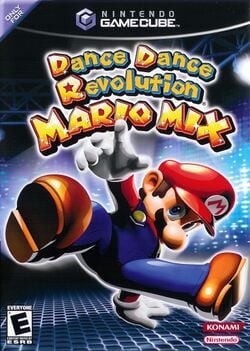
| |||||||||||
| Developer | Konami Hudson Soft Nintendo SPD Group No.2 | ||||||||||
| Publisher | Nintendo | ||||||||||
| Platform(s) | Nintendo GameCube | ||||||||||
| Release date | |||||||||||
| Language(s) | English (United Kingdom) English (United States) French (France) German Spanish (Spain) Italian Japanese | ||||||||||
| Genre | Rhythm | ||||||||||
| Rating(s) |
| ||||||||||
| Mode(s) | Single player, versus | ||||||||||
| Format | Nintendo GameCube:
| ||||||||||
| Input | Nintendo GameCube: Nintendo GameCube Action Pad
| ||||||||||
| Serial code(s) | |||||||||||
Dance Dance Revolution: Mario Mix (known as Dancing Stage: Mario Mix in Europe and Australia) is a Nintendo GameCube game in the Super Mario franchise based on Konami's Dance Dance Revolution series, and it is the second dancing game to be released on the Nintendo GameCube, after MC Groovz Dance Craze. The songs included are electronic dance music covers primarily from various aspects of the Super Mario franchise, including songs from not only the mainline titles but also the Mario Party series, Paper Mario series, Mario Kart series, and more. In addition, a number of songs in the game are rearranged from classical, royalty-free songs such as Wolfgang Amadeus Mozart's "Turkish March." A unique feature of the game from other Dance Dance Revolution titles is the addition of the Mush Mode, where various Super Mario-themed items replace arrows with their own gimmicks to increase the difficulty of the song.
The game uses an included Super Mario-themed dance mat, referred to as an Action Pad. However, players have the option to play with a controller if they lack a dance mat. The game uses the same engine from the GameCube installments of the Mario Party series, including reusing character models, animations, and sound effects.
Story Mode[edit]
From the instruction booklet:
Someone has stolen the Music Keys, which contain the power of music! They were locked up in Truffle Towers for safekeeping, but someone broke the seal and unleashed this power onto the Mushroom Kingdom. Now the chaotic power of music has begun to wreak havoc on the land, causing floods, whirlpools, and other disasters.
Once again, it's up to Mario to save the day! Only this time, he's got to do it in his dancing shoes! Legend has it that dancing can make magic happen. And Mario's going to need all the magic he can get to recapture the scattered Music Keys and restore order to the world.
The opening scene starts out with Waluigi breaking into Truffle Towers. This is troublesome as the Music Keys are able to grant any wish. However, when Waluigi opens the door to the room of the four Music Keys, they all scatter across the Mushroom Kingdom except for one that Waluigi gets to keep. Meanwhile, Toad, having seen this, rushes to tell Mario or Luigi, depending on which character the player chose.
Toad warns Mario (or Luigi) that someone has stolen the Music Keys and explains the trouble that this causes. Mario decides to stop Waluigi, and Toad decides to come with him to Truffle Towers. On a boat, the two cross a river, and after climbing a vine, they reach Truffle Towers. However, once there, the two find the doors to Truffle Towers locked. Waluigi then laughs and tosses a Bob-omb at them, knocking Mario down a nearby Warp Pipe into a cavern filled with Goombas, though Mario is able to get out by dancing, causing the mushroom he is standing on to grow. After Mario escapes the cavern, he and Toad enter a shop run by a Lakitu, who has the key to Truffle Towers. He agrees to give it to them only if Mario is able to get rid of the Koopa Troopas playing in his farm. After Mario does so, Lakitu gives him and Toad the key, and the latter two enter Truffle Towers. Inside is Waluigi with one of the Music Keys; he refuses to return it unless he is beaten in a dance-off. After Mario and Toad beat him, Waluigi is gone and the Music Key is recovered. Mario and Toad set off on the SS Brass to recover the other keys.
On Mario and Toad's way to investigating a seaside area, a cyclone suddenly appears and causes the SS Brass to spin out, turning a nearby hotel into a corkscrew. Toadette, the owner of the hotel, comes out and scolds Mario for ruining her hotel. Mario, however, decides to dance to fix the hotel, and after the hotel is fixed, he and Toad set out to sea, only to get caught in a whirlpool. They escape the whirlpool and sail to a nearby island to rest. Here, they find a shop run by a pirate Lakitu who has a device called the Boogie Booster, which will allow their ship to travel through the whirlpool. Lakitu refuses to give it to them, though afterward decides that they duel to decide who can have the part. After Mario and Toad beat Lakitu, he installs the part onto their ship, allowing them to get through the whirlpool. Toad notes that the Music Keys have something to do with the storms, and the SS Brass sails into the whirlpool down to an underwater temple, where a Music Key is being guarded by a Big Blooper. After defeating it in a dance-off, Mario and Toad retrieve the second Music Key.
Mario and Toad head to their next destination, Wario's carnival. They arrive at the entrance, which is blocked by two Hammer Bros. who refuse to let Mario and Toad through unless they are able to beat them in a dance-off. After Mario beats them, the Hammer Bros. allow them to enter the park. Inside, they see Wario riding a roller coaster while carrying a Music Key. Mario and Toad chase after him on the roller coaster and on foot until finally cornering him in front of a Ferris wheel, where he states that he plans to use the Music Key to wish for his own game: DDR: Wario Mix. Wario then challenges Mario to a dance-off on the Ferris wheel, though when he loses, he gives Mario the Music Key.
Mario and Toad's next destination is a snow-covered mountain, where they notice the final Music Key inside a Freezie at the top. After Toad fails to climb up the slippery path, they instead enter a nearby Warp Pipe leading to an underground tunnel that ends up taking them higher up on the mountain. After warming up in a nearby log cabin, they reach the top of the mountain and try to claim the Music Key, though the Freezie does not give it up. Toad suggests melting it, and after Fire Flowers are used on it, the Freezie melts, and Mario and Toad claim the key. The two then sled down the mountain, though an avalanche follows them; after avoiding the avalanche, the two set off back to Truffle Towers.
Mario and Toad return the Music Keys to their original place, though soon after Bowser appears and steals the keys. Mario and Toad sail to Bowser's Castle in the SS Brass, and after dodging oncoming Bullet Bills, they arrive at the castle. Bowser is about to use the Music Keys when he finds that they are gone, Mario and Toad having stolen them back. Bowser then challenges Mario to a dance-off, and after Bowser is knocked away with a rocket, he is defeated. Afterwards, Bowser admits that he was going to use the keys to fix his tone-deafness. Mario then uses the keys to turn the area surrounding Bowser's Castle into a green field, and everyone suddenly feels strange and starts to dance. The keys are then returned to Truffle Towers, and Mario finally goes home.
Gallery[edit]
Characters[edit]
Playable[edit]
| Image | Name | Description |
|---|---|---|

|
Mario Our hero is going to need some fancy footwork to get through this adventure! |
Mario is the main protagonist and the default playable character. He is Player 1 in Versus Play. |

|
Luigi Mario's little brother has his own special dance moves! |
Luigi is the other playable character in this game and is Player 2 in Versus Play. He plays identically to Mario. |
Non-playable[edit]
| Image | Name | Description |
|---|---|---|

|
Toad Mario and Luigi's loyal companion. |
Toad appears in the game's various menus and is featured as Mario and Luigi's companion in Story Mode, providing narration and commentary for the game's events. He cannot dance and relies on the Mario Bros.' skills to proceed through the game. |

|
Lakitu | Lakitu is the game's main shopkeeper who sells helpful items throughout the adventure. He has the key to Truffle Towers in World 1 and will give it to the Mario Bros. provided they clear his garden of Koopa Troopas in "Garden Boogie." |

|
Waluigi The Music Key he captured can help him become the best dancer in the kingdom! |
Waluigi is the releaser of the Music Keys in Truffle Towers and serves as the game's first boss in World 1. He is featured in his signature song, "Destruction Dance." |

|
Toadette | Toadette is the owner of a hotel in World 2 that was accidentally turned into a corkscrew by the game's protagonists. She demands them to fix it by having them dance to "Jump! Jump! Jump!" She points the protagonists to the sea when talking about "shiny globes," though they run off before she finishes talking. |

|
Lakitu (pirate) | This Lakitu is the owner of the shop called Pirate's Plunder in World 2 and is dressed and speaks like a pirate. He has the Boogie Booster that can go through whirlpools, but he refuses to give it up to the game's protagonists unless they defeat him in "Fishing Frenzy" (or "Pirate Dance" if the game is played on Story Mode EX). |

|
Hammer Bros. | A pair of Hammer Bros. obstructs the protagonists in World 3, being the first boss dance of the world. Their signature song is "Hammer Dance." They are later seen with Wario when the protagonists leave the world. |

|
Wario | Wario resides in his carnival in World 3, where he is first seen on a roller coaster while holding a Music Key. This causes the protagonists to chase him until he challenges them to a dance-off to "Starring Wario!" When he loses, he begrudgingly hands over the Music Key and yells that he will get the key back when the protagonists leave. |

|
Freezie | A giant Freezie sitting on top of a snowy mountain is the boss of World 4, which has the final Music Key embedded in it. At first, it is silent when Toad politely requests for the key, but it turns and reacts when Toad suggests the Mario Bros. dance to melt it. Its signature song is "Deep Freeze." |

|
Bowser But...what are Bowser's reasons for wanting the Music Keys? |
Bowser steals the Music Keys from Toad shortly after they arrive in Truffle Towers, taking them to World 5. Before Bowser can use the Music Keys to lend him power, Toad and the Mario Bros. steal the keys, after which Bowser demands a dance-off to "Bowser's Castle" before they can leave. Once defeated with the Rocket Parts, Bowser explains he wanted the Music Keys to fix his tone-deafness. |
Background characters[edit]
Gameplay[edit]
Action Pad[edit]
Included with the game is a dance mat, referred to as an Action Pad, that plugs into a controller socket on the GameCube. Then, standing in the center of the Action Pad, the player can simply step on an arrow when it reaches the bar on the top of the screen, called the step zone: left, right, up, or down. The player can choose to play with either Mario or Luigi in a number of modes and difficulty levels with nearly 30 songs. As the difficulty rises, moves such as jumps to step on two arrows at the same time are required, when the player must move around the mat quickly.
Incidentally, the game can be sold by itself without the Action Pad. The regular controller then uses ![]() or
or ![]() and the face buttons for directional input, with
and the face buttons for directional input, with ![]() for up,
for up, ![]() for down,
for down, ![]() for left, and
for left, and ![]() for right.
for right.
Dance meter[edit]
At the start of each song, a dance meter appears in the upper left corner (and upper right corner for two players and boss battles/dance-offs). It consists of ten stars, with each song starting with five (this can be varied with items). As the players get "Perfect!"s and "Great!"s, the meter rises. When they miss, it decreases. In the Options menu, the player can set how much a miss decreases their dance meter, and in Story Mode, the higher the difficulty, the more they lose. The meter flashes if the player is under two and a half stars. If the dance meter runs out of stars, the song ends automatically, and the player gets a "Failed" message and an F for the song. In Story Mode, the player loses a life.
Grades for each step[edit]
Each step the player makes gets a grade that affects the player's overall score, by giving points per step:
- Perfect!: The player hit the step right on the mark. In actuality, there is a margin of error for this step. If they hit the step exactly, the arrow flashes white; if they miss it slightly, it flashes yellow. Either way, the player earns the maximum points for the step.
- Great!: Also known as Super. The player hit the step almost perfectly. The player earns half the maximum points for the step.
- Early/Late: The player missed by a bit. The player earns no points, and the dance meter stays the same.
- Miss...: The player did not step on the arrow at all. The player earns no points, and the dance meter decreases.
Getting "Perfect!"s and "Great!"s not only increases the player's dance meter but also adds a combo onscreen. When the player gets a combo of 100, the announcer comments and arrows flash differently when players step on them. A combo stops if the player does a misstep (Early, Late, or Miss). As with all Dance Dance Revolution games, the announcer comments on the player's dancing skill and grade along the way. This can be turned off in the Options menu. If the player's dance meter empties, an option can allow the player to finish the song right away, but the player still gets an F grade.
Grades for the song[edit]
When the player keeps their dance meter filled and gets a "Cleared" message at the end of the song, these are the possible grades:
- A (AA in the Japanese version) – "Can I call you a dancing master?" This is the top grade, earned with a couple, if any, missteps.
- B (A in the Japanese version) – "You're a fantastic dancer! You should dance one more time!" This is a very good grade, earned with very few missteps.
- C (B in the Japanese version) – "Bravo!" This is a fair grade, earned with some missteps.
- D (C in the Japanese version) – "Excellent!" This grade is earned with a significant number of missteps.
- F (D in the Japanese version) – "Wha-wha-what?" (international) / "Aw, you couldn't make it!" (JP). A ton of missteps lead to this grade, even if the player clears the song.
Two major factors decide the grade for a song: the number of missteps in relation to the song length, and total points. As the difficulty rises, more missteps can still mean a better grade (B), but the A still requires barely any missteps.
Difficulties[edit]
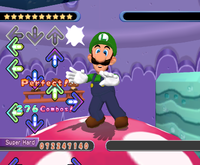
- Easy: Includes only left and right arrows.
- Normal: Basic cardinal steps.
- Hard: Steps per song are up to 200 at times. Common patterns appear in step sequences.
- Very Hard: The number of steps is from 125 to over 200 in some spots. Complicated patterns that require shuffling of feet and moving off the center occur.
- Super Hard: Over 200 steps in each song. The song "Bowser's Castle," for example, has 337 steps. Offbeat steps may also take place.
While Dance Dance Revolution: Mario Mix does not have an official difficulty chart for its songs, the game is not as intense as standard versions of Dance Dance Revolution. Comparing using the difficulty measurement system introduced in DDRMAX2 -Dance Dance Revolution 7thMIX-, the Easy difficulty uses only left and right arrows, which standard Dance Dance Revolution games do not have; Normal difficulty is equivalent to Beginner; Hard difficulty is equivalent to Light; Very Hard difficulty has a mix of Light and Standard depending on how far in the story the song is; and songs on Super Hard difficulty contain a mix of Standard and Heavy songs also depending on far in the story the song is.
In Story Mode, the player can choose Easy or Normal at the beginning of the adventure, and this choice stays permanent throughout all the songs. It can be changed only by a Music Wand. When Story Mode EX is unlocked, the option to play on Hard becomes available, and when that mode is cleared, Very Hard is unlocked.
Dance-offs[edit]
Two players, one as Mario and the other as Luigi, can face off in any song at any difficulty like Free Mode. However, the initial package comes with one dance mat. A second one must be ordered online at Nintendo's official website.
Music[edit]
| Title | Stage | Game and music | Original composer | Easy | Normal | Hard | Very Hard | Super Hard |
|---|---|---|---|---|---|---|---|---|
| Here We Go! |
1-1 | Super Mario Bros. (Ground Theme) | Koji Kondo | 37 | 47 | 110 | 145 | 193 |
| Underground Mozart* |
1-2 | Mario Bros. (Eine Kleine Nachtmusik) | Wolfgang Amadeus Mozart | 43 | 53 | 173 | 222 | 293 |
| Pipe Pop |
1-2EX | Turkish March | Wolfgang Amadeus Mozart | 49 | 59 | 145 | 186 | 260 |
| Garden Boogie |
1-3 | Carmen | Georges Bizet | 42 | 54 | 154 | 201 | 280 |
| Destruction Dance |
1-4 | Wrecking Crew (Bonus Stage) | Hirokazu Tanaka | 45 | 19 | 148 | 188 | 237 |
| Jump! Jump! Jump! |
2-1 | Super Mario Bros. 3 (Athletic Theme) | Koji Kondo | 56 | 80 | 112 | 187 | 256 |
| Fishing Frenzy* |
2-2 | Yoshi's Cookie (Csikos Post) | Hermann Necke | 61 | 97 | 126 | 160 | 235 |
| Pirate Dance |
2-2EX | Super Mario World (Ground Theme) | Koji Kondo | 51 | 104 | 142 | 199 | 258 |
| In the Whirlpool* |
2-3 | Pomp and Circumstance | Edward Elgar | 76 | 100 | 125 | 160 | 224 |
| Step by Step |
2-3EX | Super Mario World (Bonus Men BGM) | Koji Kondo | 79 | 90 | 116 | 155 | 232 |
| Blooper Bop |
2-4 | Super Mario Bros. (Underwater Theme) | Koji Kondo | 60 | 73 | 126 | 149 | 190 |
| Hammer Dance |
3-1 | Super Mario Bros. 3 (Ground Theme) | Koji Kondo | 68 | 95 | 152 | 196 | 270 |
| Rollercoasting |
3-2 | Mario Kart: Double Dash!! (Mario/Luigi/Yoshi Circuit) | 114 | 127 | 146 | 184 | 243 | |
| Boo Boogie* |
3-3 | Super Mario Bros. 2 (Ground Theme) | Koji Kondo | 60 | 73 | 126 | 149 | 207 |
| Moustache, Barrel, and Gorilla |
3-3EX | Donkey Kong (Various) | Yukio Kaneoka | 116 | 116 | 143 | 173 | 240 |
| Starring Wario! |
3-4 | Wario World (Greenhorn Forest) | 114 | 112 | 140 | 183 | 268 | |
| Frozen Pipes |
4-1 | Old Folks at Home | Stephen Foster | 116 | 116 | 143 | 173 | 240 |
| Cabin Fever* |
4-2 | Mario Party 5 (Lots of Toys) | Aya Tanaka | 111 | 132 | 169 | 201 | 219 |
| Ms. Mowz's Song |
4-2EX | Paper Mario: The Thousand-Year Door (Ms. Mowz's Theme; X-Naut Fortress) | 121 | 135 | 175 | 213 | 239 | |
| Deep Freeze |
4-3 | Dr. Mario (Fever) | Hirokazu Tanaka | 125 | 147 | 190 | 237 | 250 |
| Rendezvous on Ice* |
4-4 | Les Patineurs | Émile Waldteufel | 116 | 129 | 194 | 248 | 255 |
| Midnight Drive |
4-4EX | Mario Kart 64 (Title Theme) | Kenta Nagata | 129 | 131 | 169 | 209 | 224 |
| Always Smiling |
5-1 | Tritsch-Tratsch-Polka | Johann Strauss II | 107 | 116 | 144 | 179 | 293 |
| Bowser's Castle |
5-2 | Mario Kart: Double Dash!! (Bowser's Castle) | 126 | 146 | 177 | 268 | 337 | |
| Up, Down, Left, Right |
Twinkle, Twinkle, Little Star | 28 | 36 | 131 | 159 | 231 | ||
| Choir on the Green** |
Ah, Lovely Meadow | 47 | 60 | 124 | 153 | 203 | ||
| Hop, Mario!*** |
Super Mario World (Title Theme) | Koji Kondo | 62 | 75 | 136 | 160 | 216 | |
| Where's the Exit?**** |
Super Mario Bros. (Underground Theme) | Koji Kondo | 61 | 80 | 141 | 181 | 266 | |
| Piroli***** |
Famicom Disk System (BIOS) | 60 | 72 | 142 | 167 | 252 |
*The song appears only in the regular Story Mode. In Story Mode EX, it is replaced by the next song.
**Unlock it with coins in World 1 store in Story Mode EX
***Unlock it with coins in World 2 store in Story Mode EX
****Unlock it with coins in World 3 store in Story Mode EX
*****Unlock it with coins in World 4 store in Story Mode EX
Modes[edit]
- Story Mode: Waluigi has stolen the Music Keys from Truffle Towers. Toad accompanies the brother of the player's choice in this adventure.
- Free Mode: All the songs played in Story Mode are unlocked in this mode, where the player can play any desired song at any difficulty, Mush Mode on or off.
- Minigames: These unlock themselves while the player plays Story Mode. A list of these can be found later in the article.
- Workout: When the players enter their names and weights, the number of calories burned are kept on record. Before Story or Free Mode is started,
 has to be pressed to set whose record will be updated.
has to be pressed to set whose record will be updated.
Types of arrow patterns and Mush Mode[edit]
Arrow patterns[edit]
Mush Mode[edit]
Mush Mode is the Mario twist to the standard series genre. Common enemies and items from the Super Mario franchise replace steps on the screen and must be either stepped on or avoided. Others cover the screen when the player misses steps, giving the player less time to react. Initially, Mush Mode is enforced in Story Mode, but it can be turned off in Options. Mush Mode is optional in Free Mode. On the hardest difficulties, two Mush Mode effects are not uncommon.
| Enemy/Item | Description |
|---|---|
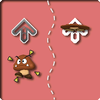 Goombas |
Just like with regular arrows, the player should step on Goombas, squashing them. |
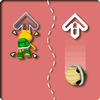 Koopa Troopas |
For each one, the player should step on it once to put it in its shell, then once more to either defeat it or send it down the screen to destroy a step. For the latter to occur, the player must get a white-flash "Perfect!" step. |
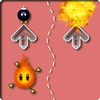 Bob-ombs and Podoboos |
Podoboos replace steps, and when the player misses one, it hits a Bob-omb, greatly decreasing their dance meter. In dance-offs, Podoboos are passed off to the other player and timed back in with the song. |
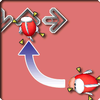 Cheep Cheeps |
Cheep Cheeps curve into the screen, giving the player less time to see where to step. They work in the same way as Podoboos in dance-offs. |
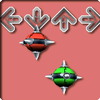 Spinies |
Like with Shock Arrows in later Dance Dance Revolution titles, stepping on Spinies' spikes causes them to explode and decreases the player's dance meter. On the harder levels, they can be timed with real steps. Red Spinies move faster than green Spinies. |
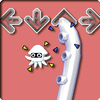 Bloopers |
When the player misses a mini-Blooper (which works as a regular step), ink covers the bottom of the screen, and the player cannot see arrows coming up. The Big Blooper moves a tentacle up the screen at a fast rate. On harder difficulties, two tentacles may move up at once. |
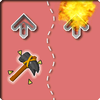 Hammer Bros. |
Represented as hammers, Hammer Bros. appear only during "Hammer Dance." They act the same as Podoboos in single and dance-off mode. If the player misses a hammer, it explodes, decreasing their dance meter. |
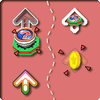 Coin Switches |
Stepping on a Coin Switch (which moves faster than regular arrows usually) turns all arrows into coins for a few seconds, helping the player obtain coins in Story mode. Some of them curve in like Cheep Cheeps and move fast. The better the step grade (Perfect to Early/Late), the longer the arrows remain coins. |
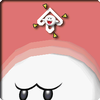 Boos |
A Giant Boo sits on the bottom of the screen, and as the player misses steps, it moves up, blocking more of the incoming arrows (creating, in essence, the effect of the "Sudden" modifier in other Dance Dance Revolution games). Stepping on mini-Boos pushes it back down. |
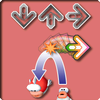 Cheep Cheeps ("Frozen Pipes") |
Cheep Cheeps pop up and change a step's direction halfway up the screen, sometimes even later. On harder difficulties, two may come up at the same time. |
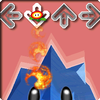 Freezie |
Appearing only in "Deep Freeze," Freezies act just like the Boos and Giant Boo, except a huge Freezie covers the screen, and when the player steps on a Fire Flower, a fireball moves down the screen into the Freezie. |
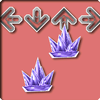 Ice Spinies |
These act identically to regular Spinies, but they do not have a visible color difference. |
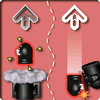 Bullet Bills |
These are found only during "Always Smiling." Bill Blasters line up at the bottom of the screen and occasionally shoot Bullet Bills timed as steps. The player must step on them to redirect them back to the Bill Blasters. A Bill Blaster has to be hit three times to get destroyed. |
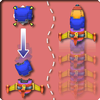 Rocket Parts |
These are exclusive to the song "Bowser's Castle." Rocket parts replace some of the steps during the song, and they have to be stepped on to build a rocket to the right side. Three consecutive parts fire a rocket at Bowser. Missing a part decreases the player's dance meter. If the player cannot shoot enough rockets at Bowser (and the fireworks sequence does not play), the player fails the song. |
Minigames[edit]
Minigames are unlocked when the players play them in Story Mode. In Story Mode, they provide coins so that the Mario Bros. can buy items. The last two minigames can be found only in Minigame Mode.
- Whack-a-Goomba – The Mario Bros. smack Goombas with a hammer as they come out of the pipes.
- Flagpole Leap – The player must press the left and right arrows to move and press up when crossing the line to grab the flagpole. The number of coins earned is the score divided by 100.
- Banana Storm – The Mario Bros. catch falling bananas from Ukikis. The number of coins earned is the number of bananas caught.
- Punch Up – The Mario Bros. punch Koopa Troopas for coins. The number of coins earned is the score divided by 10.
- Chain-Chomp Chase – The Mario Bros. must avoid the Chain-Chomp. The brothers earn 100 coins if successful, but they lose 100 coins if they fail.
- Avalanche! – The Mario Bros. dodge incoming snowballs. The brothers earn 100 coins if successful, but they lose 100 coins if they fail.
- Hidden Treasure – One chest contains one coin. The other contains 100 coins or a 1-Up Mushroom.
- Block Treasure – The Mario Bros. hit blocks to gain coins and/or items.
- Coin Collection – The Mario Bros. jump and duck to collect coins. They can earn up to 20 coins.
- Whee! – The Mario Bros. jump high into the air for coins. They can earn up to 100 coins with a perfect release.
- Note Pickup – The Mario Bros. jump and collect musical notes while on a moving platform. (Coins: N/A)
- Fire Up the SS Brass – The objective is to guide the SS Brass through a series of 15 tunnels. (Coins: N/A)
Items[edit]
Items can be bought from a store in each world from Lakitu after the player completes Stage 1-3. The classic 1-Up Mushroom can also be won in certain minigames. Sometimes bonus songs are available. All items except the 1-Up Mushroom have to be triggered before a stage for the player to feel its effects. The player can carry only three of these items at a time. The player can access the store if they visit it during their progress or before any stage after 1-3, by pressing the ![]() button.
button.
| Item | In-game description | Cost | |
|---|---|---|---|

|
1-Up Mushroom | The 1-Up Mushroom gives you another life. | 100 coins |
| Mystery Drink | The Mystery Drink increases or decreases your dance meter at random. | 10 coins | |
| Max Drink | The Max Drink increases your total dance meter. | 50 coins | |
| Small Heart | The Small Heart refills your dance meter halfway when it is empty. | 70 coins | |
| Big Heart | The Big Heart completely refills your dance meter when it is empty. | 170 coins | |
| Lucky Clover | The Lucky Clover prevents your dance meter from decreasing four times. | 50 coins | |
| Music Wand | The Music Wand drops the difficulty by one level. | 200 coins | |
Regional differences[edit]
- When the player presses Start on the title screen, the narrator of the Japanese version says, "Let's DDR," and the narrator of the international version says, "Let's Dance."
- The intro and ending of "Cabin Fever" in the Japanese version are different from the international versions.[2][3]
- In American English, Wario calls his attraction "DDR: Wario Mix," but in European languages, he calls it "Dancing Stage: Wario Mix."
- Toadette calls the Music Keys "shiny globes" in the American English version, but she calls them "shiny keys" in the British English version.
Critical reception[edit]
| Reviews | |||
|---|---|---|---|
| Release | Reviewer, Publication | Score | Comment |
| Nintendo GameCube | Matt Casamassina, IGN |
8/10 | DDR Mario Mix is a great Nintendo-ized take on the old dance formula and the first rhythm / music title to hit GameCube that's worth your consideration. The title plays like DDR with Mushroom Kingdom characters and locations. But it does have its share of extras, too, including a unique, (albeit shallow) storyline that reminds us of a Mario Party outing, a variety of logical dance locations and competitions, and some fun mini-games. The biggest disappointment is that there aren't more popular music tracks and Nintendo track remixes to inspire your groove. |
| Nintendo GameCube | Kristan Reed, Eurogamer |
7/10 | For the poor, deprived Cube owners out there that have been thus far denied the chance to strut their stuff in front of their TV, this is easily the best Dancing Stage title on any platform. That it's exclusive to the little Nintendo boxlet might just help make up for the long wait, and the fact that it comes in a nice big box with a mat included helps sweeten the deal. Sure, Dancing Stage Mario is nothing new, but it's an enduring, bizarre little concept with practically universal appeal, and a great way of wearing out super energetic kids. |
| Nintendo GameCube | Avery Score, GameSpot |
7/10 | DDR: Mario Mix is an introduction to dancing games, and it isn't suitable for fleet-footed veterans. This is too bad, because rhythm action fans would really appreciate the long-overdue gameplay revisions Mario Mix brings to bear. However, with a short story mode that serves as a fun, linear introduction to sequential stomping, Mario Mix is suitable for a child, or for an uncoordinated friend. |
| Aggregators | |||
| Compiler | Platform / Score | ||
| Metacritic | 69 | ||
| GameRankings | 71.76% | ||
Staff[edit]
- Main article: List of Dance Dance Revolution: Mario Mix staff
References to other games[edit]
- Donkey Kong – "Moustache, Barrel, and Gorilla" features samples of various jingles and sound effects from the NES version of the game. Additionally, arranged excerpts of the hammer theme and "Opening" theme are also heard.
- Mario Bros. – "Underground Mozart" samples the NES version of the Start Theme, the player-respawn sound effect, the Level Clear Theme, the pause sound effect, and the player-hit sound effect.
- Super Mario Bros. – In addition to the songs "Here We Go!", "Blooper Bop," and "Where's the Exit?" being arrangements of the Ground Theme, Underwater Theme, and Underground Theme, respectively, lots of sound effects from this game also appear. The original un-remixed Ground Theme is also heard during the credits. The minigame Flagpole Leap mimics the concept of reaching the flagpole at the ends of the levels from this game; additionally, an arrangement of the "Course Clear" fanfare plays after the player reaches the flagpole.
- Wrecking Crew – "Destruction Dance" samples and arranges the Phase Begin Theme and the Golden Hammer Theme.
- Super Mario Bros. 2 – The Ground Theme is sampled and arranged in the song "Boo Boogie."
- Super Mario Bros. 3 – The songs "Jump! Jump! Jump!" and "Hammer Dance" are arrangements of the Athletic Theme and Ground Theme, respectively. The former also uses samples from the original.
- Dr. Mario – "Deep Freeze" is an arrangement of "Fever," as well as using samples from the original. It also features a few sound effects from the game.
- Super Mario World – Three themes from this game are arranged: "Pirate Dance" is an arrangement of the Athletic Theme, "Step by Step" is an arrangement of the bonus game theme, and "Hop, Mario!" is an arrangement of the theme "Title."
- Mario Kart 64 – "Midnight Drive" is an arrangement of the Title Theme.
- Mario Party 4, Mario Party 5, and Mario Party 6 – This game uses a modified engine based on these games. Many poses, voice clips, and animations, such as the losing animation, are reused from these games. The song "Cabin Fever" is an arrangement of the Toy Dream theme from Mario Party 5.
- Wario World – The music for Greenhorn Forest is arranged in the song "Starring Wario!"
- Mario Kart: Double Dash!! – "Rollercoasting" is an arrangement of the music for Mario Circuit, Luigi Circuit, and Yoshi Circuit. Additionally, the theme for Bowser's Castle is arranged in the namesake song.
- Paper Mario: The Thousand-Year Door – The theme for Ms. Mowz as well as the music for X-Naut Fortress are arranged in "Ms. Mowz's Song."
References in later games[edit]
- Super Smash Bros. Brawl – Bowser's artwork from Dance Dance Revolution: Mario Mix reappears as a sticker.
- Mario Kart Wii – Mario and Luigi's artwork is reused from this game, while Baby Mario and Baby Luigi's artwork is based on Mario and Luigi's artwork. Their artwork was also reused in Mario Super Sluggers.
- Fortune Street – Luigi's artwork from this game is reused.
- Mario Sports Superstars – Bowser's artwork has been reused for this game.
- Super Smash Bros. Ultimate – Mario's down smash is now changed to his breakdance kick from this game.
- Mario vs. Donkey Kong (Nintendo Switch) – Mario's official artwork uses the same pose as Dance Dance Revolution: Mario Mix, albeit updated.
Gallery[edit]
Logos[edit]
Artwork[edit]
Box art[edit]
Action Pad bundle[edit]
Models[edit]
Screenshots[edit]
Miscellaneous[edit]
Media[edit]
- For a complete list of media for this subject, see List of Dance Dance Revolution: Mario Mix media.
| File info 0:30 |
| File info 0:30 |
| File info 0:30 |
| File info 0:30 |
| File info 0:30 |
Quotes[edit]
- Main article: List of Dance Dance Revolution: Mario Mix quotes
- "If you can get rid of these Koopa Troopas, the key to Truffle Towers is yours!" – Lakitu
- "What are you doing here? This is a PRIVATE dance party!" – Waluigi
- "Wait a second. I got it! Maybe we can fix it by dancing! And by we, I mean you." – Toad
- "It's an exploration of greed, stench, and stubby legs through interpretive dance." – Wario
- "I was going to use the power of the keys to...to...fix my tone deafness. How embarrassing." – Bowser
Names in other languages[edit]
| Language | Name | Meaning | Notes |
|---|---|---|---|
| Japanese | Dance Dance Revolution with MARIO ダンスダンスレボリューション ウィズ マリオ[4] Dansu Dansu Reboryūshon wizu Mario |
Dance Dance Revolution with Mario | |
| Dutch | Dancing Stage Mario Mix[5] | - | |
| French | Dancing Stage Mario Mix[5] | - | |
| Korean | 댄스댄스레볼루션 with 마리오[6] Daenseu Daenseu Rebollusyeon wijeu Mario |
Dance Dance Revolution with Mario |
Trivia[edit]
- The highest score for a song is 100,000,000, achieved by getting a "Perfect!" on all 337 steps in the song "Bowser's Castle" on Super Hard difficulty.
- World 1-2 is considered different from the other boards. Its EX song, "Pipe Pop," is the only EX song in the game that is not related to a Nintendo composition whatsoever. World 1-2 is also the only board where both the original starter song and the EX song are referenced from the same artist, who is Wolfgang Amadeus Mozart.
- This is the only game in which Waluigi appears but not Princess Peach.
References[edit]
- ^ Dance Dance Revolution: Mario Mix. The Mushroom Kingdom (English). Retrieved June 28, 2024.
- ^ GilvaSunner (March 23, 2011). Cabin Fever - Dance Dance Revolution Mario Mix. YouTube (English). Archived February 18, 2020, 14:02:40 UTC from the original via Wayback Machine. Retrieved June 29, 2024.
- ^ March 3, 2014. Cabin Fever (Dance Dance Revolution Mario Mix). YouTube. Retrieved June 29, 2024.
- ^ Japanese boxart
- ^ a b European boxart
- ^ 62.댄스댄스 레볼루션 With 마리오 (NGC). (2018. 1. 3). 이누네코의 게임자료실. Retrieved November 28, 2024.
External links[edit]
| Nintendo GameCube games | |
|---|---|
| Super Mario franchise | Luigi's Mansion (2001) • Super Mario Sunshine (2002) • Mario Party 4 (2002) • Mario Golf: Toadstool Tour (2003) • Mario Kart: Double Dash!! (2003) • Mario Party 5 (2003) • Paper Mario: The Thousand-Year Door (2004) • Mario Power Tennis (2004) • Mario Party 6 (2004) • Dance Dance Revolution: Mario Mix (2005) • Mario Superstar Baseball (2005) • Mario Party 7 (2005) • Super Mario Strikers (2005) |
| Donkey Kong franchise | Donkey Konga (2003) • Donkey Konga 2 (2004) • Donkey Kong Jungle Beat (2004) • Donkey Konga 3 JP (2005) |
| Wario franchise | Wario World (2003) • WarioWare, Inc.: Mega Party Game$! (2003) |
| Other | Super Mario 128 (2000, demo) • Super Smash Bros. Melee (2001) • Nintendo Puzzle Collection (2003) • NBA Street V3 (2005) • SSX on Tour (Nintendo Village) (2005) • Donkey Kong Racing (cancelled) • Diddy Kong Racing Adventure (cancelled) |
